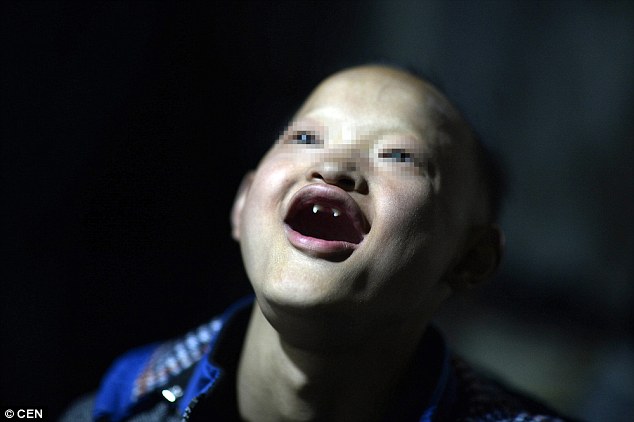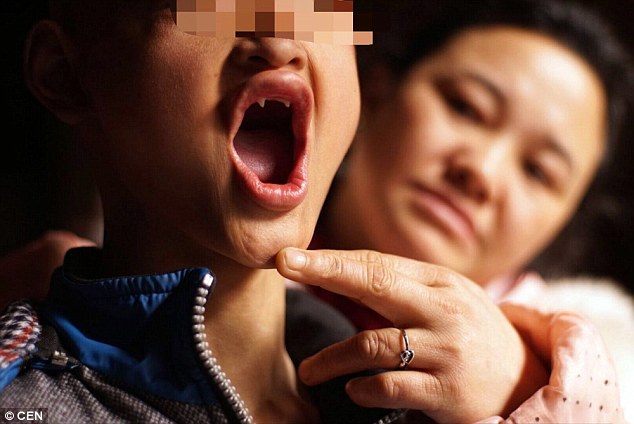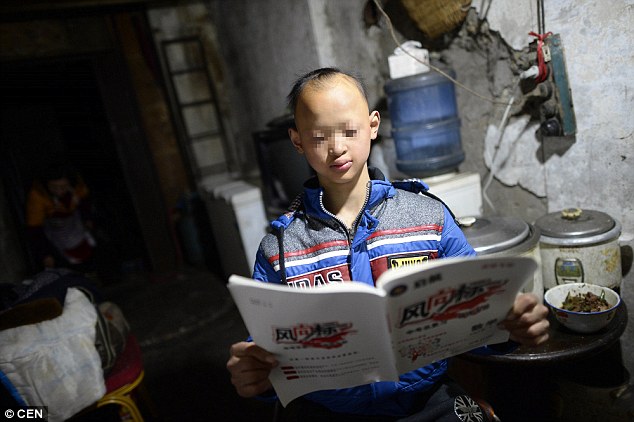A teenager in China has been named ‘fang boy’ after his rare medical condition left him with just two pegs for teeth.
The 15-year-old, known as Lan Hai (not his real name), lives in Yongchuan town, Chongqing, and suffers from congenital Ectodermal Dysplasia, the People’s Daily Online reports.
According to his mother, Ma Yuxu, several of her families members also have the condition, which has resulted them being called the ‘vampire family’ by neighbours.

Labelled Fang Boy: 15-year-old Lan Hai suffers from a rare disease called ectodermal dysplasia

Loving mother: Ma Yuxu says that her son has spent most of his childhood in hospital being treated for fevers
The disease has affected Lan Hai’s hair and teeth.
Apart from only having two pegs for teeth, his hair is sparse and he is sensitive to light.
The boy said due to his appearance, he had been constantly laughed at by his playmates and classmates.
He says his only wish is to have teeth implants in order to improve his quality of life, however his family can’t afford the treatment costs.
His mother, Ma Yongxu, spoke to local reporters on Tuesday at the Southwest Hospital of Third Military Medical University in Chongqing while she was taking Lan Hai for treatment.
Ma said when Lan Hai was born in 2001, the midwives were shocked.
She added: ‘They thought the boy looked so strange because there was not a single hair on his head.’
According to Ma, the disease seems to be genetic.
Her youngest brother also suffers from Ectodermal Dysplasia and among all the children of her seven siblings, four of them including Lan Hai have the symptons.
Ma said in her hometown Xuyong County in Luzhou, all neighbours were afraid of her siblings and relatives and have called them the ‘vampire family’.

Ectodermal Dysplasia: The disease meant that the boy’s teeth were just two pegs by the time he was two

Self conscious: The boy says the disease has affected his self confidence and a new set of teeth would help
Because of the state of Lan Hai’s teeth, Ma has to feed him with liquid foods leading to signs of malnutrition. His best option is a teeth implant.
According to his mother, Lan Hai spent most of his childhood in hospital being treated for fevers and sensitivity to light.
She says that by the time he hit his second birthday, he only had two pegs for teeth.
When he was just four years hold, he was hospitalised for a fever and doctors told Lan’s parents that he wouldn’t survive.
It was discovered that the boy does not have sweat glands.
Without sweat glands, he cannot control his body temperature and risks suffering a fatal seizure if his body overheats or gets too cold.

Devoted mother: His mother sells food at a snack stand during the evenings to keep them financially afloat
His father installed a tank in a shaded area of their yard so that he could keep cool during the summer months.
When Lan Hai was five, his father became ill and later passed away. Before he died, he made his wife promise that she would not abandon the boy.
In 2009, his mother remarried and in 2013 she gave birth to another boy. Unfortunately the baby had the same disease and died within six months from a fever.
Her new husband couldn’t cope and later disappeared leaving Lan Hai and his mother to fend for themselves. She makes money by running a late night food stand.
The boy says sometimes people’s stares are hard to deal with and affect his self confidence. He says that if he had new teeth then it would make him more confident.
Ectodermal dysplasias are a group of 150 inherited disorders that are estimated to affect just 7,000 people worldwide.





